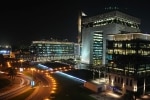This page either does not exist or is no longer available. Please try one or more of the following:
- Check the spelling in your web address bar
- Visit the Strategy& Middle East homepage
- Contact us and let us know which page you were looking for
- Use the search bar below
You can use the search box below and look for the content you were after.
Useful links

© 2019 - 2026 PwC. All rights reserved. PwC refers to the PwC network and/or one or more of its member firms, each of which is a separate legal entity. Please see www.pwc.com/structure for further details.












Menu